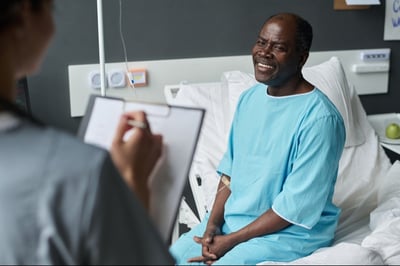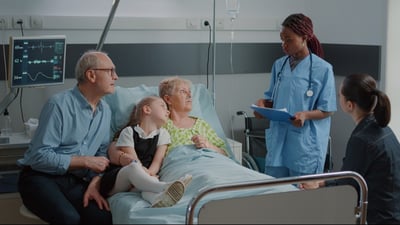Colorectal Cancer



Relevance: High
Most relevant for: People with unresectable or metastatic colorectal cancer that is MSI-High or dMMR
Study: Two immunotherapy drugs are better than one for some metastatic colorectal cancers
Combining two immunotherapy drugs is a more effective treatment for certain metastatic colorectal cancers than using either treatment drug alone. Used together, Opdivo (nivolumab) plus Yervoy (ipilimumab) slowed cancer growth in MSI-High metastatic colorectal cancers, a type of colorectal cancer often found in Lynch syndrome. The FDA approved this combined treatment for MSI-High metastatic colorectal cancer after progression with chemotherapy. (Posted 4/30/25)
READ MORE ›


Relevance: Medium-High
Most relevant for: People with colorectal cancer or at risk of colorectal cancer
Update: News from the FDA: Colorectal cancer screening and treatment
This XRAY review is a summary of FDA colorectal cancer (CRC) updates in the last year, including education regarding CRC screening, three treatment drugs targeting different types of CRC and two colorectal screening tests. (Posted 4/16/25)
READ MORE ›


Relevance: Medium-High
Most relevant for: People at high risk for hereditary cancer
Guideline: Hereditary cancer gene guidelines expand
The National Comprehensive Cancer Network regularly updates guidelines for several types of hereditary cancer. These recommendations often change when new research is published. Recently, the NCCN expanded its guidelines to include information on hereditary prostate and gastric cancers. (Posted 1/6/25)
Este artículo está disponible en español.
READ MORE ›


Relevance: Medium-High
Most relevant for: People with cancer interested in using cannabis to help manage symptoms.
Study: Use of cannabis for cancer symptom management
Among people with cancer, interest in the use of cannabis to manage cancer symptoms and treatment side effects is high. The world's leading professional organization of oncologists has published strategies to help adults with cancer and their healthcare providers have open, nonjudgmental discussions about the use of cannabis to manage cancer symptoms. (Posted 9/27/24)
Este artículo está disponible en español.
READ MORE ›


Relevance: Medium-High
Most relevant for: People with Lynch syndrome and people with colorectal cancer who may have Lynch syndrome
Study: Colorectal cancer in people with Lynch syndrome can include types of cancer found more typically in people without Lynch syndrome
When people with Lynch syndrome (LS) develop cancer, their tumors typically have a related set of features or biomarkers known as deficient mismatch repair (dMMR) and high microsatellite instability (MSI-High). However, occasionally people with Lynch syndrome have cancers that are proficient in mismatch repair (pMMR or MMR-P) and have microsatellite stability (MSS or MSI-Low) –more like the colorectal cancers found in people without Lynch syndrome. This study shows that 10 percent of people with Lynch syndrome may have these types of cancers. This can change treatment recommendations. (Posted 9/5/24)
Este artículo está disponible en español.
READ MORE ›


Relevance: High
Most relevant for: People diagnosed with cancer
Topic: Acupressure for cancer symptom relief
Acupressure is a safe treatment that can be used to relieve some symptoms of cancer and side effects of treatment. Light pressure applied to key points on the body may help with fatigue, sleep, nausea and possibly other symptoms as well. (Posted 8/1/24)
Este artículo está disponible en español.
READ MORE ›


Relevance: Medium-High
Most relevant for: People with advanced HER2-positive cancer
Topic: The drug Enhertu is FDA-approved for any advanced or metastatic HER2-positive tumors
The FDA granted accelerated approval of Enhertu for people with any HER2-positive tumor that is metastatic or cannot be surgically removed. Eligible patients must have had previous treatment such as chemotherapy or hormone therapy. (Posted 7/19/24)
Este artículo está disponible en español.
READ MORE ›


Relevance: Medium-High
Most relevant for: Cancer patients
Topic: Experts call for early palliative care for cancer patients
People with cancer need support and care not only at the end of life but from the time of diagnosis. At the 2024 American Society of Clinical Oncology (ASCO) annual meeting, the organization’s president urged cancer healthcare professionals to make palliative care central to cancer treatment. (Posted 7/17/24)
Este artículo está disponible en español.
READ MORE ›


Relevance: Medium
Most relevant for: People with Li-Fraumeni syndrome
Personal Story: Living a full life with Li-Fraumeni syndrome
This XRAY review is about a five-time cancer survivor who has an inherited mutation in the TP53 gene. People with inherited mutations in TP53 have Li-Fraumeni syndrome, which is linked to a very high lifetime risk for many types of cancer. Here we share his inspiring story and provide more information on Li-Fraumeni syndrome. (Posted 4/16/24)
Este artículo está disponible en español.
READ MORE ›


Relevance: Medium-High
Most relevant for: People with colorectal cancer
Update: News from the FDA - Two new metastatic colorectal cancer treatments
The FDA recently approved two new treatments for metastatic colorectal cancer. (Posted 3/22/24)
Este artículo está disponible en español.
READ MORE ›